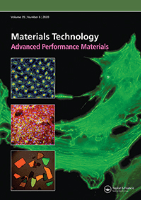
MATERIALS TECHNOLOGY
Scope & Guideline
Pioneering Research in Materials Science
Introduction
Aims and Scopes
- Advanced Material Synthesis and Characterization:
The journal publishes research on novel synthesis methods for materials, including nanoparticles, composites, and bio-materials, focusing on their structural, optical, and mechanical properties. - Biomedical Applications:
A significant scope includes studies on materials designed for biomedical applications, such as drug delivery systems, wound healing, and biocompatibility of implants, showcasing the integration of materials science with healthcare. - Nanotechnology and Nanomaterials:
Research on nanomaterials, including their synthesis, characterization, and application in various fields such as electronics, energy storage, and environmental remediation, remains a core area of focus. - Energy Materials:
The journal emphasizes materials for energy applications, including photovoltaics, batteries, and fuel cells, highlighting innovative approaches to enhance efficiency and sustainability. - Environmental and Green Materials:
A growing area of interest is the development of eco-friendly materials and sustainable synthesis processes, including the use of bio-sourced materials and green chemistry techniques. - Computational Modeling and Simulation:
The integration of computational methods to predict material behavior and performance is a key aspect, aiding experimental findings and guiding the design of new materials.
Trending and Emerging
- Green Synthesis and Biogenic Materials:
There is a notable increase in studies focusing on environmentally friendly synthesis methods for nanoparticles and materials, utilizing plant extracts and sustainable processes. - Smart and Multifunctional Materials:
Research on smart materials, including stimuli-responsive and multifunctional materials for applications in sensors, drug delivery, and biomedical devices, has gained significant momentum. - Energy Storage and Conversion Technologies:
The emergence of advanced materials for energy storage and conversion, particularly in batteries and supercapacitors, is a prominent trend, driven by the demand for sustainable energy solutions. - 3D Printing and Additive Manufacturing:
The application of materials in 3D printing and additive manufacturing technologies is increasingly popular, reflecting a shift towards personalized and efficient manufacturing processes. - Nanomedicine and Targeted Therapies:
A growing focus on nanomedicine, particularly the use of nanoparticles for targeted drug delivery and cancer therapy, showcases the intersection of materials science and healthcare. - Computational Materials Science:
The integration of computational techniques, including machine learning and molecular dynamics, to predict material properties and optimize designs is emerging as a critical area of research.
Declining or Waning
- Traditional Bulk Material Studies:
Research focused primarily on traditional bulk materials without innovative methodologies has decreased, as the field shifts towards nanostructured and advanced materials. - Conventional Coatings and Surface Treatments:
Studies on basic surface treatments and conventional coatings are less frequent, with a growing preference for multifunctional and smart coatings that provide additional benefits. - Standard Material Testing and Characterization:
Publications centered solely on standard mechanical testing or characterization methods without novel insights or applications have shown a decrease, as interdisciplinary approaches gain traction. - Metallurgy and Alloy Development:
While metallurgy remains important, there has been a noticeable decline in research focused exclusively on traditional alloy systems without the integration of advanced processing or applications. - Non-Eco-Friendly Synthesis Routes:
Research involving non-eco-friendly synthesis methods is declining, reflecting a broader trend towards sustainability and environmental considerations in materials science.
Similar Journals
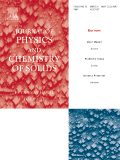
JOURNAL OF PHYSICS AND CHEMISTRY OF SOLIDS
Illuminating the Science of SolidsJOURNAL OF PHYSICS AND CHEMISTRY OF SOLIDS, published by Pergamon-Elsevier Science Ltd, is a distinguished international journal that has been at the forefront of disseminating cutting-edge research in the fields of physics, chemistry, and materials science since its inception in 1956. This journal, which is recognized for its high impact in the Q2 category across multiple subjects—including Chemistry (miscellaneous), Condensed Matter Physics, and Materials Science—serves as a vital platform for researchers, professionals, and students to engage with significant advances in solid-state physics and chemistry. With Scopus rankings placing it in the top 15% of its field across various domains, the journal plays a crucial role in shaping the scientific dialogue surrounding materials properties, synthesis, and applications. Although it does not currently offer open access options, the presented research is widely recognized for its quality and relevance, ensuring that published works contribute meaningfully to ongoing scholarly discussions.

ACS Materials Au
Exploring the Frontiers of Materials ScienceACS Materials Au, published by the American Chemical Society, is a premier open-access journal that has been at the forefront of materials science since its inception in 2021. With an ISSN of 2694-2461, this journal encompasses an expansive range of topics including biomaterials, electronic, optical and magnetic materials, materials chemistry, and polymers and plastics, consistently achieving Q1 rankings in these categories for 2023. The journal is based in the United States and operates from the AMS's headquarters in Washington, DC, offering significant visibility and a robust platform for researchers. The journal's commitment to open access ensures wide dissemination of groundbreaking research, enabling a diverse audience—including researchers, professionals, and students—to engage with the latest advancements in materials science. With an encouraging impact factor and a focus on novel materials and innovative applications, ACS Materials Au stands as a vital resource for anyone devoted to understanding and advancing the frontiers of materials engineering and science.
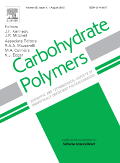
Carbohydrate Polymers
Fostering collaboration in polymer research.Carbohydrate Polymers is a prestigious academic journal, published by ELSEVIER SCI LTD, that plays a vital role in the field of materials chemistry, organic chemistry, and polymer science. With its Q1 category rankings in these domains, this journal serves as a critical platform for disseminating high-quality research, innovative methodologies, and significant advancements in carbohydrate-based polymers. Since its inception in 1981 and continuing until 2025, it has fostered critical discussions and collaborations among researchers, professionals, and students worldwide. Although it does not offer open access, its rigorous peer-review process ensures that only the most impactful studies are published. By highlighting new developments in the synthesis, characterization, and application of carbohydrate polymers, Carbohydrate Polymers consistently contributes to the enhancement of knowledge and technology within its field, making it an essential resource for anyone working at the intersection of chemistry and materials science.
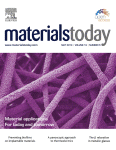
Materials Today
Pioneering Research for Tomorrow's TechnologiesMaterials Today is a premier academic journal published by Elsevier Science Ltd, specializing in the dynamic fields of materials science, mechanical engineering, and condensed matter physics. Established in 1999, the journal has garnered an enviable reputation, consistently ranking in the Q1 category across multiple disciplines including mechanics of materials and general materials science, reflecting its influence and high-quality research output. With an impressive Scopus ranking—4th in both mechanical engineering and mechanics of materials, and 6th in condensed matter physics—Materials Today serves as an essential resource for researchers, professionals, and students seeking to stay at the forefront of developments in material innovations and applications. The journal is known for its commitment to publishing significant research findings and reviews, making it a vital platform for disseminating knowledge and fostering collaboration in the rapidly evolving materials field. Although it does not offer open access, its robust impact factor underscores the importance of the content published, ensuring wide visibility and citation among the academic community. Explore the rich tapestry of materials research with Materials Today, where groundbreaking insights pave the way for future technological advancements.

JOURNAL OF MATERIALS SCIENCE-MATERIALS IN ELECTRONICS
Driving Progress in Electronic Materials ResearchJOURNAL OF MATERIALS SCIENCE-MATERIALS IN ELECTRONICS, published by Springer, is a distinguished international journal that serves as a vital platform for the dissemination of cutting-edge research in the field of materials science, with a keen focus on electronics. Since its inception in 1990, this journal has consistently contributed to the advancement of knowledge across a range of interdisciplinary categories, including Atomic and Molecular Physics, Optical and Magnetic Materials, and Biomedical Engineering, achieving notable quartile positions in various 2023 Scopus rankings. With an impact factor that signifies its scholarly influence, this journal provides a rigorous peer-reviewed environment for researchers and practitioners to share innovative ideas, experimental findings, and theoretical developments. Although it does not currently offer open access options, the depth and breadth of topics covered—including condensed matter physics and bioengineering—make it an essential resource for those at the forefront of materials research. With a commitment to bridging the gap between theory and practical application, the JOURNAL OF MATERIALS SCIENCE-MATERIALS IN ELECTRONICS continues to pave the way for future explorations in the ever-evolving landscape of materials science.
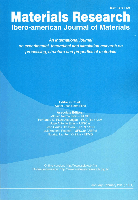
Materials Research-Ibero-american Journal of Materials
Exploring new horizons in condensed matter and materials engineering.Materials Research-Ibero-american Journal of Materials, published by the UNIV FED SAO CARLOS, DEPT ENGENHARIA MATERIALS, is a prominent platform dedicated to advancing the field of materials science. Launched in 1998, this Open Access journal has fostered a culture of inclusive knowledge sharing, allowing researchers and practitioners worldwide to access valuable insights in Condensed Matter Physics, Materials Science, Mechanical Engineering, and Mechanics of Materials. With a commendable Q3 ranking in these diverse categories in 2023, the journal provides a vital resource that bridges theoretical research and practical applications in materials technology. Covering a range of topics from novel material characterization to innovative engineering solutions, Materials Research serves as a critical forum for contributors across the globe, particularly those in Latin America. Researchers, students, and professionals are encouraged to engage with this journal, which operates with a clear commitment to high standards and is based in São Carlos, Brazil, further enhancing its relevance and appeal within the international materials research community.

Korean Journal of Materials Research
Innovating Today for a Sustainable TomorrowKorean Journal of Materials Research is a pivotal publication in the field of materials science, offering a platform for innovative research and comprehensive reviews in miscellaneous materials applications. Published by the MATERIALS RESEARCH SOC KOREA, this journal has been a valuable resource since its inception in 2007 and continues to disseminate vital findings through 2024. Although currently categorized in Q4 of the Materials Science quartiles, the journal is committed to advancing knowledge and fostering research collaboration within the scientific community. With an ISSN of 1225-0562 and an E-ISSN of 2287-7258, the journal aims to bridge gaps in research and practice, appealing to a diverse audience of researchers, professionals, and students interested in the latest advancements in materials science. While access to content may not be open, the journal's impact in the regional and global research landscape is steadily growing, as indicated by its Scopus ranking in the 7th percentile of General Materials Science. Engage with the Korean Journal of Materials Research to stay at the forefront of materials innovation!
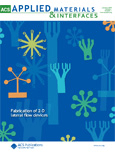
ACS Applied Materials & Interfaces
Elevating Knowledge in Materials Science and NanotechnologyACS Applied Materials & Interfaces, published by the American Chemical Society, stands as a leading journal in the field of applied materials, nanotechnology, and interdisciplinary research in medicine. With an impressive Impact Factor that places it in the Q1 category across Materials Science, Medicine, and Nanoscience and Nanotechnology, this journal consistently ranks among the top tier, evidencing its significance and influence in advancing scientific knowledge. The journal’s scopus ranking of 33 out of 463 in General Materials Science further underscores its critical role in disseminating innovative and high-quality research. Although it is not an open-access journal, a diverse range of access options is available, ensuring that vital research findings are accessible to a broad audience of researchers, professionals, and students. Targeting breakthroughs in the synthesis, characterization, and application of materials and interfaces, ACS Applied Materials & Interfaces serves as a pivotal platform for publishing cutting-edge studies essential for future technological advancements.

ADVANCED FUNCTIONAL MATERIALS
Transforming Ideas into Advanced Functional SolutionsADVANCED FUNCTIONAL MATERIALS is a leading journal published by WILEY-V C H VERLAG GMBH, prominently recognized in the fields of biomaterials, chemistry, condensed matter physics, and materials science. With an impressive impact factor and a distinguished position in the Q1 quartile across multiple categories including nanoscience and nanotechnology, this journal serves as a vital platform for researchers and professionals committed to innovating in functional materials. Since its inception in 2000, ADVANCED FUNCTIONAL MATERIALS has published high-quality peer-reviewed articles that push the boundaries of materials science, exploring new frontiers in electronic, optical, and magnetic materials. The journal's dedication to open access ensures that its groundbreaking findings are readily available to a global audience, fostering collaboration and knowledge-sharing among scholars and practitioners in the field. For those seeking to stay at the forefront of materials research, ADVANCED FUNCTIONAL MATERIALS is an essential resource.

Frontiers in Materials
Unveiling Breakthroughs in Material Technologies.Frontiers in Materials, an esteemed journal published by FRONTIERS MEDIA SA, is a leading platform in the field of Materials Science, with a notable impact factor placing it in the Q2 category of its discipline as of 2023. Since its establishment as an Open Access journal in 2014, it has fostered considerable academic exchange, allowing researchers from around the globe to share their innovative findings and insights. Based in Lausanne, Switzerland, this journal not only emphasizes high-quality peer-reviewed articles but also prioritizes rapid dissemination of research, as evidenced by its commendable Scopus ranking of #62 out of 196 in Materials Science (miscellaneous). By consistently striving to bridge the gap between academia and practical applications, Frontiers in Materials serves as an invaluable resource for researchers, professionals, and students seeking to delve into cutting-edge advancements and transformative applications in materials science.